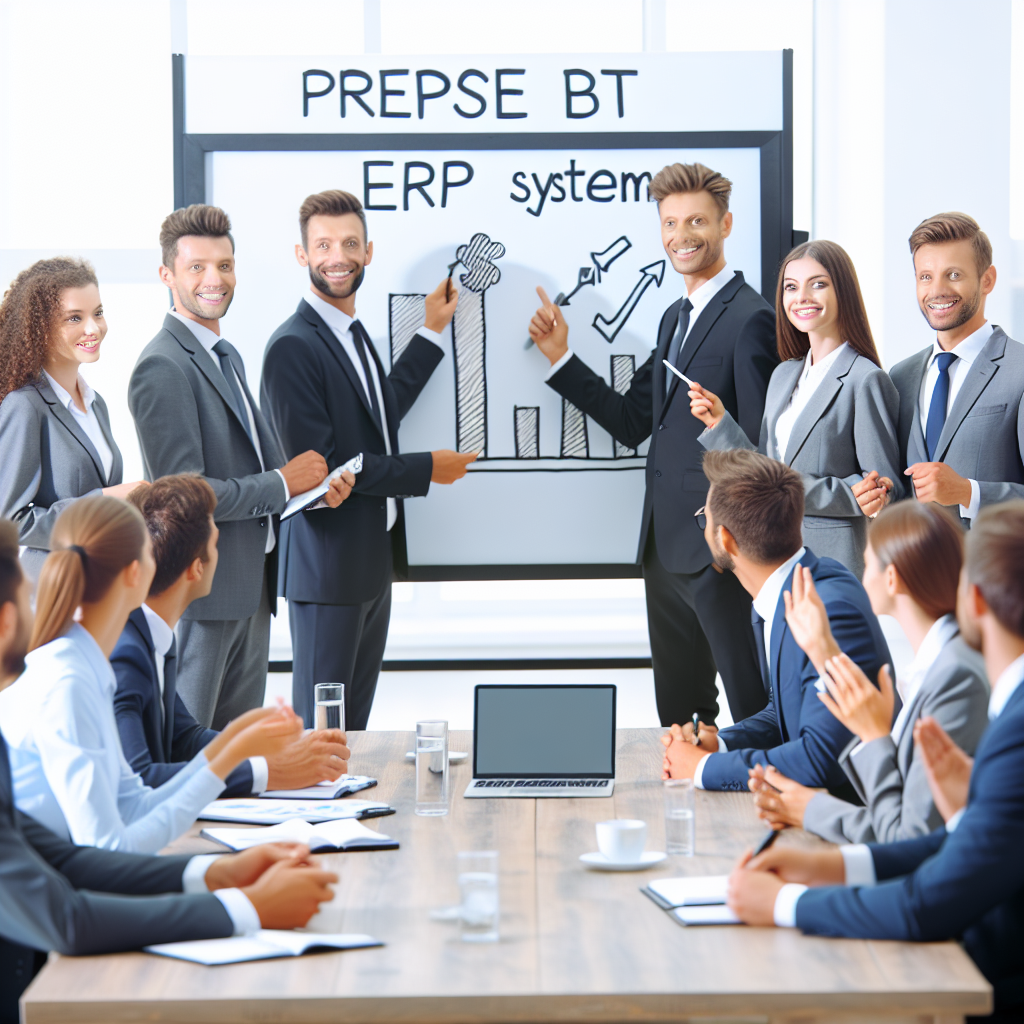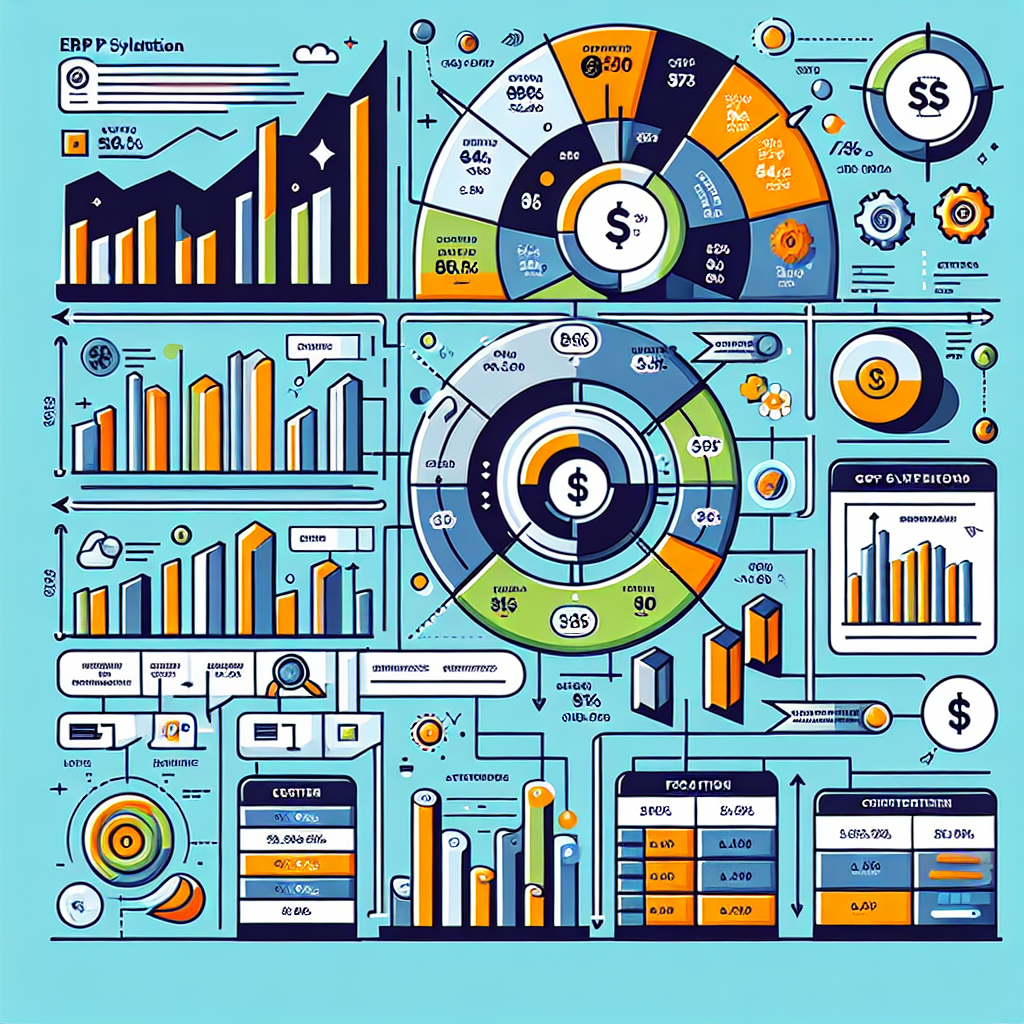"Discover Competitive ERP System Prices and Unmatched ERP Systems Value"
What Influences the ERP System Price and How Can You Save?

When it comes to understanding the erp system price, it can sometimes feel like navigating a maze. Various factors contribute to the overall costs, yet there are also numerous strategies to bring those expenses down. Lets dig into what influences these prices and, importantly, how you can save!
Key Factors Affecting ERP Price
Heres a breakdown of the significant factors that influence erp systems prices:
- ⚙️ Customization Needs: The more unique your requirements, the higher the cost. A custom-built ERP system tailored to your specific business processes can start at around €12,000, depending on complexity.
- ⭐ Number of Users: As your user base grows, so does the pricing. Licensing models typically charge per user. For instance, a package for 50 users might set you back €5,000 annually.
- ⭐ Integration with Existing Systems: If you already use software solutions, integrating these into your new ERP can add to costs, often requiring an extra €3,000 or more.
- ⭐ Security Features: Investing in robust security features is crucial, especially since 43% of cyberattacks target small businesses. Enhanced security can add at least €2,000 to your overall costs.
- ⭐️ Ongoing Support and Maintenance: Dont forget about long-term costs! Many companies spend between 15% to 20% of the initial erp system price each year for support and updates.
Examples of How These Factors Play Out
Consider this scenario: A mid-sized company needs a customized ERP system to manage its operations efficiently. After analyzing its requirements, the company realizes that:
- Customization would add at least €10,000 to the initial erp system price.
- Integrating with existing inventory software requires another €4,000.
- With 25 users, licensing fees will cost about €3,000 yearly.
All of this leads to an estimated first-year total of €17,000 – a substantial investment! Yet, the efficiencies gained in inventory management could lead to savings of up to 30% in operations costs, significantly offsetting this initial expense.
Ways to Save on ERP System Prices
So, how can you lower your overall erp price? Here are some effective tips:
- ⭐ Choose Open Source Solutions: These can significantly reduce initial costs. However, ensure you have the skills or resources for customization and maintenance.
- ⭐ Assess Your Needs Thoroughly: Clarity is key! Carefully evaluating your requirements will help you avoid unnecessary features that inflate costs.
- ⭐ Negotiate: Don’t hesitate to discuss costs with vendors. Many are open to adjusting their prices, especially for long-term contracts.
- ⭐ Consider Phased Implementation: Rather than a full-blown rollout, introducing your ERP system in phases can help distribute the costs over time.
Statistical Insights
It’s worth noting that a recent survey indicated that organizations that switch to integrated ERP systems often see a return on investment (ROI) of about 30% in the first year alone. Additionally, research shows that 70% of companies report improved efficiency post-ERP implementation. So, while the initial costs may seem daunting, the long-term benefits can be substantial!
Real Client Story: How We Helped
A manufacturing client approached us burdened by the high costs of their legacy systems. After an in-depth assessment, we created a personalized ERP solution for them at €15,000. The improvements in their workflow and data visibility allowed them to save €8,000 in operational costs within the first year! They were thrilled and have since expanded their services with us.
Ready to Explore Your Options?
Don’t let pricing confusion hold you back from transforming your business! At Zuniweb Studio, we have 20 years of experience and a team of professional specialists ready to assist you. Whether you are looking for a comprehensive ERP system or ongoing technical support, we provide all services in one place, ensuring a smooth journey from development to support.
Contact our customer relations manager, Alexandr, at Go Telegram Chat or visit us at zuniweb.com to discover tailored solutions for your needs!
Frequently Asked Questions
- What is the average cost of an ERP system?
Costs vary widely but can range from €10,000 to over €100,000, depending on customization and user needs. - Are there ongoing costs after implementation?
Yes, there are maintenance and support fees that typically range from 15% to 20% of the initial investment annually. - How can businesses ensure theyre not overpaying?
Businesses should clearly define their requirements, compare vendors, and negotiate prices. - What integration costs should I expect?
Integration can add anywhere from €3,000 to €10,000 based on existing setups and systems. - Can I negotiate with ERP vendors?
Yes, many vendors are open to discussion, particularly for long-term contracts. - Is open-source ERP a good option?
Yes, it can significantly reduce costs, but be prepared for customization and maintenance efforts. - What benefits can I expect from an ERP system?
Expect improved efficiency, reduced operational costs, increased visibility, and better decision-making capabilities. - How long does it take to implement an ERP?
Implementations can take anywhere from a few months to a year depending on the complexity and scale of the system. - What if our needs change after implementation?
Most ERP systems allow for modifications and scaling, though additional costs may incur. - Why is support important in an ERP system?
Continuous support ensures optimal functioning, security, and timely updates, crucial for smooth operations.
Unpacking the Myths: Are ERP Systems Prices Really High?
contact us
Game apps can be really expensive to build and maintain, but don’t worry, we do everything in our mix to ensure that you get the best, for the best cost.

When businesses hear the term ERP system price, there’s often an unspoken assumption lingering in the air: “It’s going to cost a fortune!” This myth, while partially rooted in truth, deserves a thorough examination. Let’s shed some light on what the real situation is with ERP systems prices and why you shouldnt be scared off by perceived costs!
Dispelling the Cost Myths
Many assume that adopting a high-quality ERP system is only for vast enterprises with deep pockets. However, this generalization doesn’t stand against scrutiny. Here are some common myths debunked:
- ⭐ Myth 1: ERP systems are only for large companies.
This couldn’t be further from the truth! According to a survey by Nucleus Research, companies of all sizes can benefit from ERP systems. In fact, small and medium-sized businesses can see a considerable ROI within the first year, sometimes exceeding 30%! - ⭐ Myth 2: ERP systems are overly complicated and costly to implement.
While customization can raise prices, many out-of-the-box solutions are affordable and relatively easy to install. Basic packages often start around €10,000 and can be tailored as your business grows! - ⭐ Myth 3: All ERP systems have the same pricing structure.
Pricing models can differ significantly! Some vendors offer cloud-based options with lower upfront costs, while traditional on-premises systems may have hefty initial investments but lower ongoing expenses. Its essential to do your homework!
Understanding Pricing Structures
Let’s explore how the pricing structures for ERP pricing can vary:
| Type of ERP | Average Initial Cost (EUR) | Annual Maintenance (EUR) |
| Cloud-based ERP | €5,000 - €20,000 | 15% of setup cost |
| On-Premises ERP | €10,000 - €100,000 | 20% of setup cost |
| Open Source ERP | €2,000 - €10,000 | Variable based on customization |
| Industry-specific ERP | €15,000 - €50,000 | 15%-20% of setup cost |
Real-Life Cost Savings
Consider a retail business that integrated an ERP system to manage its inventory and sales data. Initially hesitant due to the perceived high cost, they decided to invest around €15,000 in a tailored solution. Within a year, they noticed a 40% reduction in inventory holding costs and an overall 25% increase in sales efficiency. The initial fears transformed into celebrations of return on investment!
Are Your Concerns Valid?
It’s not uncommon for businesses to enter the ERP arena with trepidation. Questions such as “Will it be worth it?” or “Can we handle the transition?” often arise. These concerns are valid! However, investing in an ERP system often means streamlining operations, reducing manual errors, and ultimately saving costs far beyond the initial expenditure.
Conclusion: Don’t Let Myths Dictate Your Business Decisions
While the perception of high prices for ERP systems can deter potential users, the reality is more complex. Understanding the diversity in pricing structures and clear examples of successful implementations can help you see the value an ERP system offers. At Zuniweb Studio, we’re dedicated to providing tailored solutions that fit various budgets. With 20 years of experience in IT development, we promise you’ll get the best value possible!
Interested in learning more about our customized ERP solutions? Call Alexandr at Go Telegram Chat or visit our website zuniweb.com – let’s transform your business together!
Frequently Asked Questions
- Is adopting an ERP system a wise financial decision?
Absolutely! Many businesses see returns within the first year due to improved efficiency and reduced operational costs. - How can I determine my business’s ERP needs?
Start by analyzing your current processes and identifying areas of improvement. Consultation services may help in crafting a tailored solution. - What are the hidden costs involved with ERP systems?
Be aware of ongoing maintenance, training, and potential integration costs when considering overall expenses. - Are cloud-based ERPs more cost-effective?
They tend to have lower upfront costs and are easier to scale. However, it’s essential to consider long-term expenses as well. - Can small businesses benefit from ERP systems?
Yes! Many small businesses have successfully implemented ERP solutions and reported improved efficiencies and profitability. - How do I choose the right ERP vendor?
Research vendors, read reviews, ask for demos, and evaluate their support services to ensure they align with your needs. - What should I expect during ERP implementation?
Expect training periods, some disruptions in workflow, and a learning curve. However, these challenges are usually outweighed by the benefits! - Is customization necessary for every ERP implementation?
No, many businesses can function effectively with standard solutions. Customization becomes essential only if unique processes are in place. - How can I measure the ROI of an ERP system?
Track key performance indicators like operational efficiency, time savings, and customer satisfaction to evaluate the ROI. - What happens if my needs change after implementing an ERP?
Most ERP systems allow for modifications, but this may incur additional costs. Always consult your vendor for upgrade options.
How to Compare ERP Price Options for Your Business Needs
contact us
Game apps can be really expensive to build and maintain, but don’t worry, we do everything in our mix to ensure that you get the best, for the best cost.

Choosing the right ERP system can feel like a daunting task, especially with the wide range of erp systems prices out there. However, understanding how to compare these options will empower you to find a solution that not only fits your business needs but also aligns with your budget. Let’s break this down into manageable steps!
Step 1: Identify Your Business Requirements
Before diving into pricing, it’s crucial to pinpoint exactly what your business needs. Here are some questions to consider:
- ⭐ What processes need automating? Make a list of all the business workflows you want the ERP system to cover.
- ⭐ How many users will need access? This will impact the licensing costs and overall erp system price.
- ⭐ What specific features do you require? Features like invoicing, inventory management, and reporting can differ widely in cost and complexity.
Step 2: Understand Pricing Structures
ERP price structures can vary significantly. Here’s a breakdown of typical models:
| Pricing Model | Description | Typical Initial Cost (EUR) |
| Perpetual Licensing | One-time fee for a licensed version. Users pay for upgrades. | €10,000 - €100,000 |
| Subscription-Based | Monthly or annual fees that include updates and support. | €5,000 - €20,000/year |
| Pay-as-You-Go | Charges based on usage. Good for variable service demand. | Variable, depending on use |
| Open Source | Free to use with costs mainly for customization and support. | €2,000 - €10,000 |
Step 3: Request Quotes and Demos
Once you’ve established your requirements and understood pricing structures, reach out to various vendors:
- ⭐ Request comprehensive quotes: Ensure you’re comparing apples to apples by asking vendors to break down their price structures thoroughly.
- ⭐️ Ask for demos: Looking at how the ERP system works can help you assess its fit for your business.
During this phase, keep an eye on additional costs that might be associated, such as setup fees, training, and support services. A quote might look attractive, but add-ons can quickly inflate the erp system price.
Step 4: Compare Features and Support Services
As you gather quotes, create a comparison chart. Consider:
- ⭐ Feature Set: Which vendor best addresses your multifaceted needs? List your must-have features side by side.
- ⭐⭐ Support Options: What types of post-implementation support do they offer? Continuous support systems can save significant costs in the long run.
- ⏰ Time to Implementation: How long will it take to get up and running? Faster implementations can result in quicker returns!
Real Client Story: Making a Wise Choice
A client in the healthcare sector was overwhelmed by various ERP systems prices. By assessing their needs carefully and comparing multiple vendors, they opted for a cloud-based solution that resulted in an initial investment of €12,000. They prioritized essential features for patient management and reporting. Within six months, they forward-verified improved workflow efficiencies and decreased administrative costs by 25%, demonstrating that their investment was indeed wise!
Step 5: Make a Data-Driven Decision
After gathering and comparing all this information, its time for a thorough analysis. Consider as follows:
- ⭐ Short-term vs. Long-term Value: Which options offer the best return on investment?
- ⭐ Scalability: Will the ERP solution still meet your needs in three to five years?
- ⭐ User Feedback: Look for online reviews or request references from past clients to verify your findings.
Final Thoughts: Awareness is Key!
In the world of ERP systems prices, knowledge is power. The more you understand your options, the better positioned you are to make a decision that best fits your budget and business objectives. Investing in the right ERP solution not only supports your current operations but also paves the way for future growth.
At Zuniweb Studio, we’re here to help navigate this process with 20 years of experience and expertise in IT. For personalized advice and tailored solutions, give Alexandr a call at Go Telegram Chat or visit us at zuniweb.com. Let’s turn your ERP dreams into reality!
Frequently Asked Questions
- How do I know which ERP vendor is reliable?
Research vendor reviews, ask for client references, and ensure they have a history of success in your industry. - Can I use multiple vendors for ERP?
While possible, it may lead to more complications. A single vendor can often provide a more unified solution. - What if my business requirements change after purchase?
Choose an ERP system that allows for scalability to adapt to your evolving needs. - Is open-source ERP worth considering?
Yes! Its often cheaper and flexible, but requires technical know-how for customization and maintenance. - What are the risks of choosing the cheapest ERP option?
Cheapest options can lead to hidden costs, limitations in features, and insufficient support. - Are all ERP systems cloud-based now?
While many are, on-premises systems still exist and may be preferable for certain industries. - Should I prioritize price or functionality when choosing an ERP?
Consider both! A balance of functionality that fits your budget is essential for long-term success. - How can I assess long-term savings from an ERP system?
Track the improvements in efficiency, time saved, and reductions in manual errors to measure ROI. - Is training included in the ERP system pricing?
Always confirm! Training can be an extra cost in some plans. - Can I negotiate the price with ERP vendors?
Yes! Many vendors are open to negotiation, especially for long-term contracts.
Discovering Future Trends: What Will ERP System Prices Look Like in 2025?
contact us
Game apps can be really expensive to build and maintain, but don’t worry, we do everything in our mix to ensure that you get the best, for the best cost.

The landscape of ERP systems prices is evolving rapidly, driven by technology advancements and changing business demands. As we glance into 2025, understanding these trends can better prepare businesses to make informed decisions about their technology investments. So, what should we expect in the coming years?
1. Increased Adoption of Cloud-Based ERP Systems
As more companies opt for remote work solutions, the demand for cloud-based ERP systems will surge. These solutions often come with lower initial costs compared to traditional on-premises systems. In fact, forecasts suggest that cloud-based ERP system prices could decrease by 10% to 15% as new providers enter the market and competition heats up.
- ☁️ Benefits of Cloud Solutions: Ease of access, scalability, and lower maintenance requirements make them popular choices for small and medium-sized enterprises (SMEs).
- ⭐ Cost Savings: The combination of decreased setup fees and subscription models will appeal to businesses looking to minimize upfront investments.
2. Rise of Subscription-Based Pricing Models
Businesses are starting to favor subscription pricing models, which offer flexibility and predictable costs. By 2025, it is likely that:
- ⭐ Subscription-based ERP prices will dominate, leading to lower initial financial commitments.
- ⭐️ Ongoing updates and support will be built into these subscription packages, eliminating surprise costs and making budgeting simpler for companies.
3. Greater Customization at Competitive Rates
As technology advances, customization will become more accessible and affordable. In 2025, expect:
- ⭐ Tailored Solutions: Businesses will have options for customizing ERP systems at prices comparable to off-the-shelf products.
- ⭐ Low-Code/No-Code Platforms: These platforms will empower users without coding skills to make adjustments, minimizing the cost of hiring consultants.
4. Emphasis on Integrated AI and Automation
By 2025, the integration of AI and automation into ERP systems is set to revolutionize their functionality. Anticipate the following:
- ⭐ Smart Solutions: AI-driven analytics and automation will reduce manual efforts, allowing businesses to streamline operations at lower costs.
- ⭐ Enhanced Decision-Making: The investment in AI features may raise initial costs, but the long-term savings through efficiency gains will be significant.
5. Focus on User Experience and Training
As companies recognize the importance of user adoption, the focus will shift toward user experience and training. Expect:
- ⭐ Investing in Training: A portion of the budget will be directed at training programs, ensuring employees are well-equipped to utilize the new ERP systems.
- ⭐ User-Centric Design: Companies that develop intuitive and user-friendly interfaces may see a surge in demand, affecting their erp system prices positively.
6. Anticipated Cost Variability
One aspect that businesses should watch out for is the anticipated variability in ERP system prices. Factors contributing to this variability will include:
- ⭐ Market Demand: As the demand for tailored solutions rises, the prices can fluctuate based on specific needs.
- ⭐ Global Factors: Currency fluctuations and economic conditions will also affect pricing in different regions.
Real Client Scenario: The Future Outlook
A logistics company that invested early in a cloud-based ERP system back in 2021 anticipated further enhancements in the coming years. With a current subscription fee of €15,000 annually, they expect that by 2025, the cost of similar services may drop to €12,000 due to increased competition. They are excited about the efficiencies gained and how future updates may elevate their operations further while saving costs!
Conclusion: Prepare for the Future
Staying informed about these trends in ERP system prices will help businesses make strategic decisions. As technology continues to redefine how we achieve efficiency and manage resources, organizations that proactively adapt will emerge as industry leaders.
If you’re curious about how Zuniweb Studio can help you navigate this evolving landscape, don’t hesitate to reach out. Our team of professionals is equipped to guide you through selecting the right ERP system tailored to your business needs. Contact Alexandr at Go Telegram Chat or visit us at zuniweb.com to discuss your options!
Frequently Asked Questions
- Will ERP prices rise or fall in the coming years?
Overall, expect a trend toward lower prices as competition increases, especially for cloud-based solutions. - Is it better to invest in cloud ERP or on-premises ERP?
Cloud ERP usually offers lower initial costs and greater flexibility, making it a favorable option for many businesses. - How important is AI integration in future ERP systems?
AI will become a critical component for enhanced analytics and automation, providing significant advantages to users. - Are training costs included in ERP pricing?
Typically, training is an additional cost, but some subscription models may include comprehensive training. - Can customization be affordable in the future?
Yes! With the rise of low-code/no-code solutions, customization will likely be more accessible and cost-effective. - How will user experience impact ERP pricing?
Vendors prioritizing user experience may justify higher prices with enhanced intuitive designs and superior support. - Will there be a pricing standardization in the ERP market?
While some standardization may occur, price variability will remain based on differing needs and features. - What should I consider when choosing an ERP system for the future?
Focus on scalability, user experience, and alignment with your long-term business strategy. - How can I prepare my business for ERP transitions?
Invest time in training and ensure your team is involved in selecting the solutions most relevant to their daily tasks. - What role will data security play in future ERP systems?
As cybersecurity threats grow, robust security measures will become a critical factor influencing pricing and vendor choice.

Currently under development

Heroes Infinity: RPG + Strategy + Super Heroes
An epic action RPG packed with heroes, battles, and boundless adventure. Dive into the captivating world of Heroes of Infinity and embark on an unforgettable journey through cities and distant lands. Recruit powerful heroes, battle relentless enemies, and build your ultimate legendary team.
Experience seamless gameplay and captivating challenges. We blend smooth mechanics with dynamic pacing to ensure your adventure never slows down. Dive into an immersive world where every move matters — with rich visuals, responsive controls, and battles that push your strategy and skills.
RPG
mobile
strategy
Unity 3D